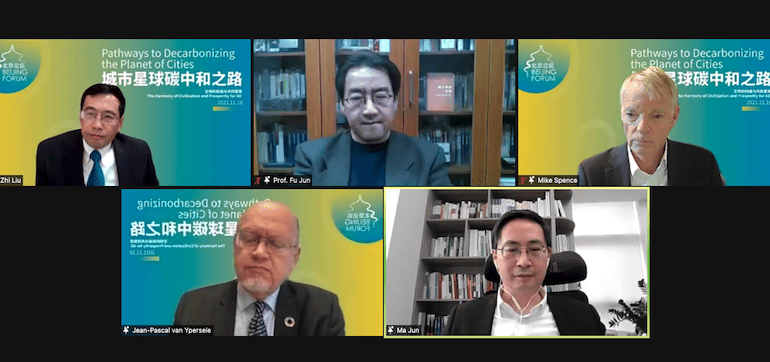
Pathways to Decarbonizing the Planet of Cities
The Peking University–Lincoln Institute Center for Urban Development and Land Policy (PLC) recently co-organized a daylong discussion about climate and energy as part of the Beijing Forum, an annual international academic event co-sponsored by Peking University, the Beijing Municipal Commission of Education, and the Korea Foundation for Advanced Studies.
The “Pathways to Decarbonizing the Planet of Cities” subforum featured scholars and policy makers from China and other countries, including Professor A. Michael Spence of New York University, recipient of the 2001 Nobel Memorial Prize in Economic Sciences, and Dr. Jun Ma, cochair of the G20 Sustainable Finance Working Group. Jointly organized with Peking University’s School of Urban and Environmental Sciences and Energy Research Institute, the conference was livestreamed in both Chinese and English, attracting nearly 8,000 viewers.
Spence delivered a keynote speech on carbon, energy, and urbanization, exploring the relationship between carbon reduction and economic growth and assessing current opportunities in the realms of energy and global collaboration. “While the challenges are enormous, there is an increasing array of low-cost, widely available, powerful tools and technologies available now, and there will be more to come,” he said. “That give us some hope that we can actually achieve” climate objectives.
Spence also analyzed potential challenges related to implementing climate regulations and commitments. At the international level, he used China and India as examples to argue that the appropriate paths and timelines of emissions goals should vary according to the pace of each country’s growth and development. He stressed the importance of transferable, cross-border technologies and finance for global climate success.
“We’ve got huge challenges, we’ve got mechanisms in the form of carbon trading, we’ve got commitment from people, and we’ve got powerful tools,” Spence concluded. “I think the big question mark is the level of international cooperation that’s going to accompany this, and it’s starting to look like it’s moving in the right direction.”
Dr. Zhi Liu, director of the PLC, moderated a roundtable discussion with panelists including climatologist Jean-Pascal van Ypersele, professor of Environmental Science at the University of Leuven, Belgium, and former vice chair of the UN Intergovernmental Panel on Climate Change; Prof. Jun Fu, academic Dean of the Institute of South-South Cooperation and Development of Peking University; Ma, who is also codirector of the Macro and Green Finance Lab of the National School of Development at Peking University; and Spence.
During the discussion, Spence analyzed the effects of past energy policy implementations and proposed that climate change and economic development should be considered as a whole. Ypersele described the positive outcomes of the COP26 meeting in Glasgow, including awareness of the urgent need to take action, the formulation of carbon trading market standards, international compensation mechanisms, and the responsibilities and willingness of developed countries to invest in climate change adaptation. Director Jun Ma discussed the development of green finance on a global scale, pointing out that China’s green investment scope includes decarbonization projects, environmental protection projects, and various biodiversity-related projects. Professor Jun Fu discussed the unique challenges that China faces in decarbonization, including the respective structures of its energy sector, which relies heavily on coal, and its government. The guest speakers agreed that they were cautiously optimistic that the world could meet the goal of limiting the rise in global temperatures to 1.5 degrees. Jun Fu recommended an approach swiftly endorsed by the other panelists: “Hope for the best, prepare for the worst.”
At the conclusion of the subforum, Liu noted that he believed the world is paying more attention to climate change and carbon neutrality, but the road ahead is still difficult. The day’s discussions shed more light on the path toward urban carbon neutrality, he added. “I feel a bit more optimistic and hopeful,” he noted at the end of the roundtable, “and I hope that our audience comes away with a bit more optimism and more hope about our future planet of cities.”
Shenmin Liu is a Research Analyst with the Land and Water Conservation Program and China Program at the Lincoln Institute of Land Policy.
Image: Participants in the Beijing Subforum roundtable included, clockwise from top left, Dr. Zhi Liu, director of the Peking University-Lincoln Institute Center for Urban Development and Land Policy; Professor Jun Fu, dean of the Institute of South-South Cooperation and Development of Peking University; Nobel-winning economist A. Michael Spence of New York University; Professor Jun Ma of Peking University, cochair of the G20 Sustainable Finance Working Group; and climatologist Jean-Pascal van Ypersele of the University of Leuven, Belgium, a former vice chair of the UN Intergovernmental Panel on Climate Change. Credit: PLC.
